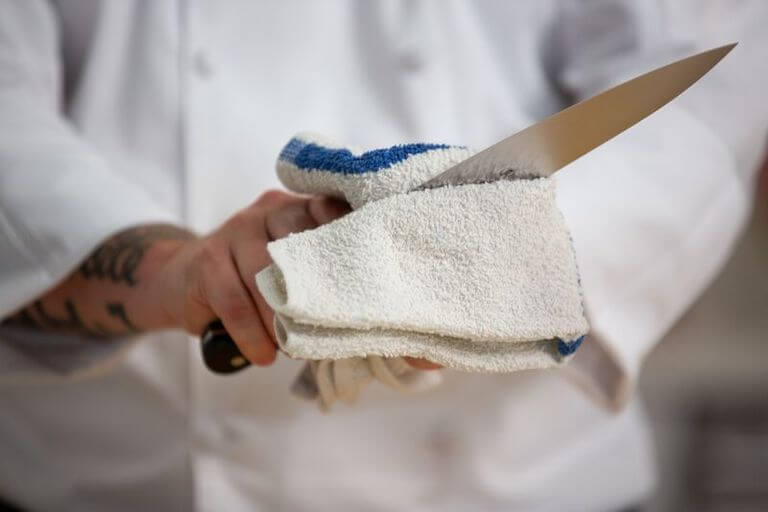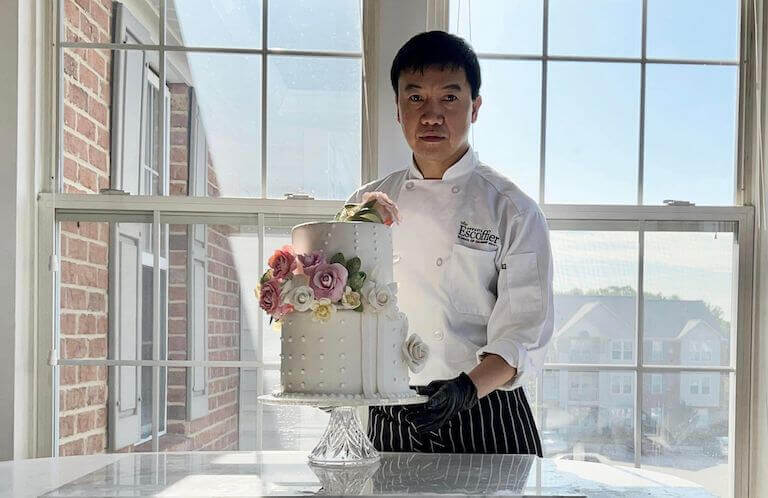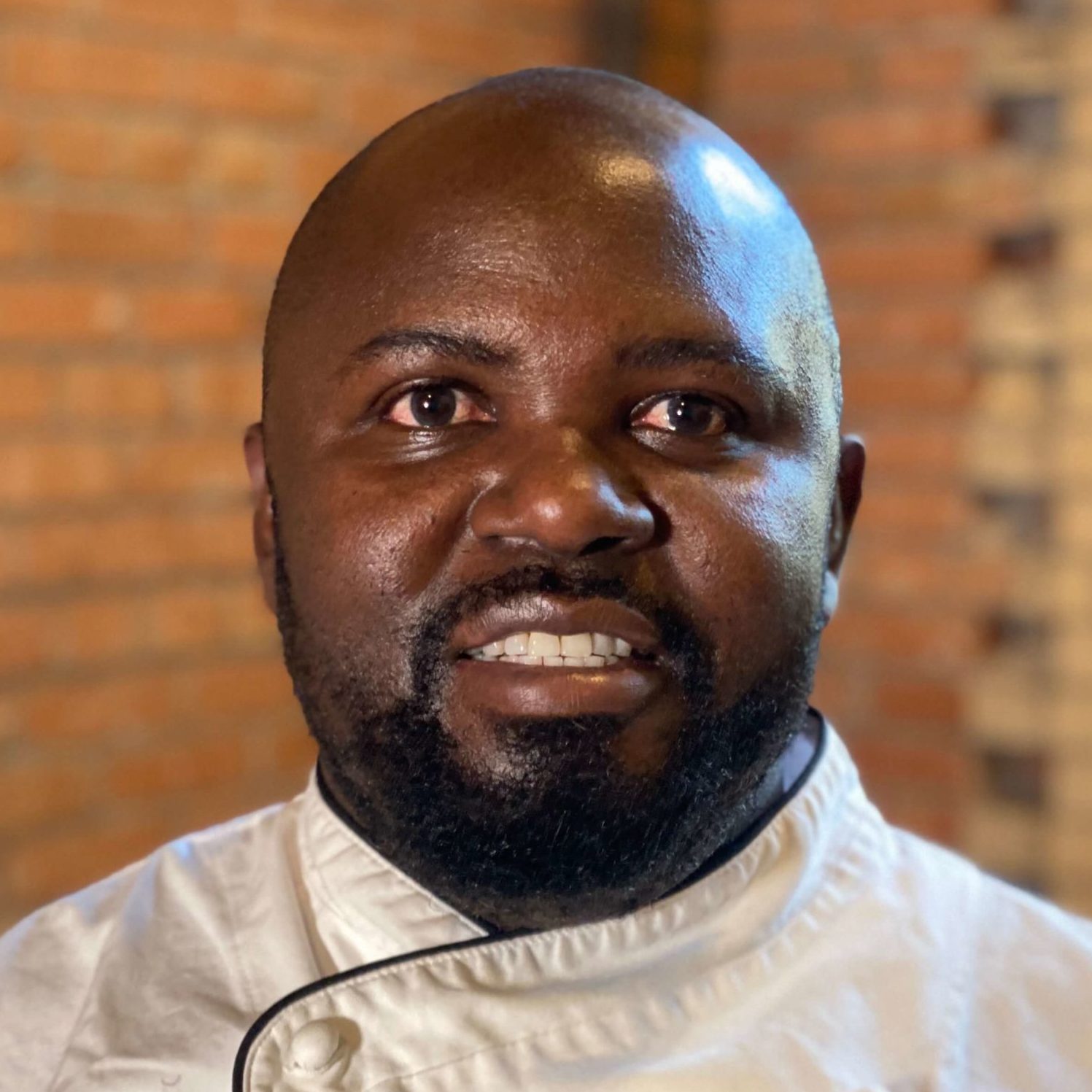Listen to This Article:
There are plenty of people who have become very successful as painters, writers, and chefs without a formal education. For this reason, education in creative pursuits like cooking might sometimes seem like a “waste of money.” So is it worth the cost?
Well, let’s remember that for every successful creative who didn’t attend school, you can find one who did.
Artist Frida Kahlo had no formal artistic training. But Pablo Picasso did, starting his art education at age 13.
Novelist Ernest Hemingway didn’t get a college education. But Toni Morrison did, studying English at Howard University.
And Chef Thomas Keller didn’t go to culinary school. But chefs James Beard, Julia Child, Christina Tosi, and David Chang all did.
Culinary school, like any postsecondary education, requires a financial investment, which might feel like a risk. So if you can get a job in the restaurant and hospitality industry without it, is culinary school a waste of money?
No! And here’s why.
Why Culinary School Is Not a Waste of Money
If you plan to pursue a permanent career in the restaurant or hospitality industry, the benefits of culinary school start the day you enter the classroom kitchen, and continue long past the day you graduate. Here’s why culinary school is likely a worthwhile investment.
1. Culinary School May Open Doors to More Job Opportunities
Not all employers require a culinary degree or diploma from their cooks and chefs. But some do. Do you want to limit your potential employment options–or opportunities for promotion–by skipping an education?
Starting your career as a professional cook with a degree or diploma could help give you a leg up over other candidates with less education. And even later in your career, employers often like to see a degree or diploma on a cook’s resumé, as it can help demonstrate their commitment to the culinary industry.
The best resumés usually include both a culinary school education and some experience in the industry. Most dedicated culinary schools require an externship as a graduation requirement. These placements frequently lead to more permanent positions or at least provide work experience in a higher-end kitchen than you can likely find as a beginner. By graduation day, you could have a culinary degree or diploma PLUS solid hands-on work experience on your resumé. And if you choose an online culinary school, you may even be able to work all through your education, leaving school with even more work experience.
*Information may not reflect every student’s experience. Results and outcomes may be based on several factors, such as geographical region or previous experience.
2. Culinary School Could Expose Students to More Skills and Techniques than On-The-Job Training
There is plenty to learn in a professional kitchen. But when you learn your trade on the job, you only learn what is necessary to execute that kitchen’s menu. For example, why would the sous chef take the time to teach you about a technique that isn’t necessary to do your job?
For this reason, on-the-job training, while valuable to your specific role, may be limited if you’re interested in becoming a well-rounded cook or chef.
In culinary school, on the other hand, students are encouraged to explore a comprehensive variety of skills, including world cuisines, advanced cooking techniques, and strategies for sustainability.

A professional chef needs to have a wide variety of good cooking skills, which begins with creating good cooking habits.
3. Formal Education May Help Culinary Grads Start Their Careers with Good Habits
Whether you work in high-end restaurants, bakeries, hotels, or cruise ships, good cooking habits can help your kitchen produce delicious food, meet important food safety laws, and stay profitable. But most kitchen supervisors aren’t going to take the time to break down all these skills for you as their employee. They have customers to serve!
In addition, the cooks in a professional kitchen weren’t hired because they’re good educators. They were hired because they’re good cooks. This means they may not be the best people to teach you the fundamentals of cooking professionally.
When you enter a restaurant kitchen without a base of culinary knowledge, you risk picking up bad habits that can hinder your future growth. If a more experienced cook tells you something is “good enough,” you’re likely to believe them! But if you know that their cleaning method isn’t actually sanitizing that surface, you can avoid making a costly—and potentially dangerous—mistake.
Culinary school allows you the opportunity to study these topics in depth and create professional habits that can help you be an asset to any kitchen.

Proper cleaning of your chef’s knife is just one example of the good habits a professional cook needs to have to succeed.
4. Students Can Get Their Foot in the Door with a Culinary Externship
A culinary externship could be the way into your dream job. Restaurants, bakeries, and food establishments of all types take on externs from culinary schools, exposing students to a work environment that they may not have experienced otherwise. Culinary schools work hard to provide their students with worthwhile externship opportunities.
Escoffier graduate Parker Wilks-Bryant was an extern at Pujol in Mexico City, one of the best restaurants in the world. Without culinary school, Parker may not have been able to secure a hands-on industry externship in this highly competitive kitchen!*
Some externships even lead to offers of full-time employment. While this is never a guarantee, it is one avenue that students can pursue to get in the door of their dream restaurant. Even if that job offer doesn’t pan out right away, students can always apply again later when they have a few years of experience under their belts and point to that previous externship on their resumes.
5. Alumni Events Help Keep Former Culinary School Students Connected with Opportunities
Culinary schools work hard to provide their former students with alumni services and events that increase their opportunities. Having access to mixers and meet-and-greets with former students and Chef Instructors is just one more way that investing in a culinary school education pays off for your career prospects.
Without a formal culinary education, you would need to invest money in conferences or other similar events to access the same kind of professional network you can access at a culinary school alumni event. And you wouldn’t have the same level of shared connections or introductions that you might get from the Chef Instructors who trained you.
Can You Have a Successful Culinary Career Without Going to Culinary School?
You might think that it’s possible to gain all the skills you would learn in culinary school from working in an actual restaurant kitchen. To some degree, it’s possible. But as in any competitive career, having a wide range of foundational skills and solid professional connections often makes the difference between success and mediocrity.
2023 Escoffier graduate Michael Fields was hired at the world-famous Franklin Barbecue in Austin, Texas. He recounted that sometimes people ask him if he even needed to go to culinary school because he’s “just” doing barbecue. And he answers, “First of all, I would never have gotten the opportunity. They would never have hired me straight off the street, ever.” He went on: “I’ve met people that started working in restaurants at age 16 or 17 and never went to culinary school, and they’re fantastic cooks, but they don’t know what they’re doing. Meaning that they don’t know why they’re doing it…[Culinary school] gives you the confidence you need to get in the door of where to start your journey, much easier than if you were just to go work in a restaurant.”
Again, it comes back to what your career goals are. You can work in kitchens and learn on the job, and maybe do well. But if you plan to work in the culinary world professionally and really want to make a mark, culinary school can likely help you be a competitive player when it comes to landing a job you love.
Who Should Go to Culinary School?
Culinary school isn’t necessarily the right choice for everyone. How might you decide if it’s a good fit for you? It all comes down to your long-term career goals.
If you’re passionate about cooking and excited about working in a high-energy kitchen environment, then culinary school may help prepare you for a thrilling career. If you prefer the idea of hands-on work instead of desk work, a culinary career fueled by culinary school may be right for you. And if you want to help people connect over shared dining experiences, then you may have the makings of a professional cook.
If any of these scenarios feel true for you, then culinary school is probably a wise investment for you.
*Information may not reflect every student’s experience. Results and outcomes may be based on several factors, such as geographical region or previous experience.
On the other hand, if you’re considering a job in the culinary industry as a way to make money for a couple of years before you pursue a degree or a career choice in another industry, then investing in culinary school may not be the right choice for you just yet. Likewise, if you’re not motivated to put in the work required to complete your culinary school experience, you may struggle to get all the value out of a culinary program.
So, do a little soul searching before you decide to attend culinary school. It’s worth it—if your professional goals match and you’re willing to put in the work!

Baking & Pastry Arts Graduate Danny N. displays his culinary skill by sharing his completed final cake.
Making the Most of Your Investment in Culinary School
There are many benefits to attending culinary school beyond what you learn in the classroom (although that’s clearly a major part of it!) By taking advantage of everything culinary school has to offer, you may increase the value of your investment and could find that you’ve better positioned yourself for your future career.
What does this look like?
Chef Instructors Can Jump Start Your Professional Network
Escoffier has over 100 professional Chef Instructors on the faculty. They include Certified Executive Chefs®, entrepreneurs, cookbook authors, industry leaders, and award-winners. Outside of culinary school, you’re unlikely to ever encounter such a skilled group of cooking professionals in one place! Chef Instructors share their cooking knowledge, but they may also be invaluable resources for career advice, mentorship, and even industry introductions.
*Information may not reflect every student’s experience. Results and outcomes may be based on several factors, such as geographical region or previous experience.
Your Fellow Students Are Likely to Become Your Future Culinary Collaborators
The chefs and industry leaders of tomorrow are the culinary students of today. That means the person cutting carrots next to you could be the next David Chang. The person kneading dough across the room could be the next Christina Tosi.*
These people can become a foundational part of your professional network. The connections you make in culinary school may be the sources of future job opportunities, advice, or collaborations. If your dream job came to you through a culinary school friend, would you call that school investment a waste of money?
Dedicated Culinary Schools Provide Unique Extracurricular Opportunities
Dedicated culinary schools are tapped into their local food industries in ways that would be hard to match by simply learning on the job. For example, Auguste Escoffier School of Culinary Arts campuses may offer opportunities for learning and networking outside of the classroom. Food festivals near the Boulder and Austin campuses have asked for student volunteers to help participating chefs in their booths in the past. This is a wonderful chance to get some fast-paced practice and to meet some of the city’s best chefs.
Other opportunities available for culinary students include optional online webinars with a Chef Instructor or a visiting chef, in-person culinary events, or field trips to local restaurants. All of these extra-curricular events provide even more professional connections for culinary students compared to what’s likely available from self-directed study.
How to Pay for Culinary School
The cost of culinary education can range widely and probably affects your feelings about whether it’s worth it. From pricey four-year schools that can cost as much as $100,000 to community college programs that are much less expensive, not all culinary schools are the same when it comes to finances.
Students are smart to consider the financial investment necessary to pay for their education and to consider how long it will take to repay any student loans they may need to take out.
At Escoffier, programs range from under $20,000 to just under $40,000 per program. This investment is much more feasible for many students than a four-year college. Here’s how students can bring this education within financial reach.

There are many possible ways to finance your culinary school education, including loans, scholarships, and federal grants.
Student Loans
If you attend an accredited culinary school like Escoffier, you may be eligible for federal student loans if you apply and qualify. These loans may have lower interest rates and more favorable repayment terms than private loans, which is why they are often the first source students seek to fund their education.
Many Escoffier students use some form of financial aid to help pay for their education! That’s why we have a dedicated financial aid team that can help students complete their paperwork and secure their funding.
*Information may not reflect every student’s experience. Results and outcomes may be based on several factors, such as geographical region or previous experience.
Scholarships and Grants
Culinary scholarships and grants are financial awards that students don’t have to repay. They can come from private companies, nonprofit organizations, and even the schools themselves.
Escoffier offers need-based scholarships to help qualifying students pay for their education. Other awards are merit-based, like the James Beard Foundation scholarships. And there are competition-based scholarships, providing financing to students who participate in culinary events.
An introduction to the annual Young Escoffier High School Competition in Austin, Texas.
Military and Veterans Benefits
Active military and veterans have additional resources they may be able to use to fund their education. Government funding can come through the Veterans Administration or the Department of Defense.
Having been designated a Military Friendly® School for 2023-2024(designated on our Austin and Boulder campuses, including our online programs), Escoffier is committed to providing support and education to military members and veterans, helping them to skill up and work towards a new career.
A Worthwhile Investment in Your Future
If you’re on the fence about attending culinary school, you have a lot to consider. But for those who are passionate about cooking and see themselves thriving in the high-energy environment of a kitchen, getting that education is a smart step toward a successful, fulfilling career in food.
Culinary school is certainly an investment of time and money. But it’s one that could pay off in the form of more job opportunities, professional skills, and industry connections. Even if you’re already years into cooking professionally, attending culinary school could help propel you to that next level.
To learn more about the financial side of culinary school, talk to a financial advisor today.
READ THESE ARTICLES TO EXPLORE THE VALUE OF CULINARY EDUCATION:
- How Much Education Do You Need to Become a Chef?
- Is a Culinary Diploma or Degree Worth It?
- What Every High School Student Should Know About Culinary School
This article was originally published on August 11, 2022 and has since been updated.
*Information may not reflect every student’s experience. Results and outcomes may be based on several factors, such as geographical region or previous experience.





